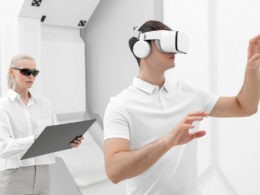In today’s fast-paced and complex work environment, puzzle-solving has emerged as a crucial skill for achieving success. Much like solving a challenging puzzle, the ability to break down complex problems, think critically, and develop innovative solutions is invaluable in the modern workplace. This article explores how puzzle-solving skills can lead to greater efficiency, collaboration, and personal success in professional settings, with a special mention of Poki Games, a popular platform that offers engaging puzzle games for skill development.
The Cognitive Benefits of Puzzle Solving
Enhances Critical Thinking
One of the key cognitive benefits of puzzle-solving is the enhancement of critical thinking. Just as puzzles require analysis, logic, and strategic planning, the workplace demands these same skills. When employees approach problems with a puzzle-solving mindset, they break issues down into manageable pieces, allowing for more thoughtful and effective solutions. This systematic approach to problem-solving ensures that no detail is overlooked, and solutions are well-thought-out.
Boosts Creativity
In addition to logic, puzzles encourage creativity. Often, there’s more than one way to solve a problem or put a puzzle together, and the same applies in business. When employees face challenges, thinking outside the box can lead to breakthroughs that may not have been possible through conventional methods. Puzzle-solving pushes individuals to explore new perspectives and strategies, fostering a more innovative work culture.
Strengthens Memory
The mental exercise involved in solving puzzles also strengthens memory. As professionals engage with complex tasks, they improve their ability to retain information and recall it when needed. This is particularly important in roles that require multitasking or managing multiple projects simultaneously, as strong memory skills enable better management of diverse responsibilities.
Puzzle Solving and Decision Making
Breaking Down Complex Problems
One of the core principles of puzzle-solving is breaking down complex problems into smaller, more manageable parts. In the workplace, this method can be applied to tackle large-scale challenges by addressing each component individually. For example, when working on a major project, identifying key tasks and delegating them appropriately can make the overall process less overwhelming and more efficient.
Weighing Alternatives
Effective decision-making often involves evaluating multiple options and selecting the best one. Puzzle-solving teaches individuals to weigh alternatives and consider the potential outcomes of each choice. This strategic thinking leads to better decision-making, as employees are trained to think through the consequences before making a final judgment.
Developing Foresight
In puzzles, anticipating future moves is essential to achieving success, and this foresight is equally valuable in the workplace. Being able to foresee potential challenges and obstacles allows employees to prepare solutions in advance. In the business world, such proactive problem-solving can prevent costly mistakes and ensure that projects run smoothly from start to finish.
Teamwork and Collaboration Through Puzzle Solving
Puzzles as a Metaphor for Collaboration
Puzzle-solving is often a collaborative effort, much like teamwork in the workplace. Just as different pieces of a puzzle come together to form a complete picture, diverse skills and perspectives within a team can combine to solve problems more effectively. When employees work together to tackle a challenge, they pool their strengths and create solutions that are greater than the sum of their parts.
Enhancing Communication
Working together to solve a puzzle requires clear communication, as team members must share their ideas and strategies openly. This practice directly translates to the workplace, where effective communication is key to achieving shared goals. By improving the way employees communicate during problem-solving sessions, organizations can foster better collaboration across all levels.
Building Resilience and Adaptability
Puzzles can be frustrating, but persistence leads to eventual success. This resilience is crucial in the workplace, where setbacks and obstacles are inevitable. Employees who develop puzzle-solving skills are more adaptable, able to handle stress, and willing to persevere until they find a solution. Such resilience leads to a more agile and capable workforce.
Puzzle Solving in Time Management and Efficiency
Prioritization
In puzzle-solving, identifying the most important or challenging pieces early on can help frame the entire process. Similarly, in the workplace, prioritizing tasks allows for greater efficiency. When employees focus on the most critical tasks first, they ensure that the most impactful work is completed promptly, leading to smoother project management and better results.
Process Optimization
Just as puzzle solvers look for patterns to guide their approach, employees can optimize their workflows by identifying efficient ways to complete tasks. Treating workplace tasks as puzzle pieces that fit together into a larger process can lead to more streamlined operations, reduced time wastage, and improved productivity.
Avoiding Burnout
Solving puzzles can also serve as a mental break from other tasks, helping employees recharge while still keeping their minds active. Taking short breaks to engage in problem-solving activities can prevent burnout, leading to more sustained productivity and overall well-being in the workplace.
Real-Life Examples of Puzzle Solving in the Workplace
Many organizations recognize the value of puzzle-solving and incorporate it into their employee training programs. For instance, some companies use escape rooms or virtual puzzle-solving games as team-building exercises, allowing employees to practice collaboration, communication, and problem-solving in a fun, low-stress environment. These exercises mirror real-world challenges, helping employees develop the skills they need to succeed in their roles.
Professionals across industries have also attested to the benefits of puzzle-solving. For example, engineers, project managers, and creative professionals have shared how puzzle-solving has helped them approach complex projects with a more structured and creative mindset, leading to successful outcomes.
Practical Ways to Incorporate Puzzle Solving at Work
Puzzle-Solving Exercises for Employees
Companies can introduce puzzle-solving exercises into their workplace routines to encourage problem-solving skills. These activities can include virtual games, group problem-solving challenges, or even escape room scenarios that allow employees to practice working together under pressure.
Brainstorming Techniques
Encouraging puzzle-solving strategies during brainstorming sessions can lead to more innovative ideas. By treating problems like puzzles, employees can approach them with curiosity and creativity, exploring multiple solutions and finding the most effective one.
Fostering a Problem-Solving Culture
To further promote puzzle-solving in the workplace, organizations can create a culture where problem-solving is celebrated. Regularly presenting employees with challenges, rewarding innovative solutions, and encouraging out-of-the-box thinking can help cultivate an environment where puzzle-solving skills are honed and valued.
Conclusion
Puzzle-solving is more than just a pastime—it’s a key to success in the workplace. By developing cognitive abilities such as critical thinking, creativity, and memory, and applying these skills to decision-making, teamwork, and time management, employees can tackle complex challenges with confidence. Incorporating puzzle-solving into workplace practices not only boosts individual performance but also fosters a more resilient, adaptable, and innovative workforce. In today’s dynamic professional landscape, mastering the art of puzzle-solving can truly unlock the door to success.
⸻ Author Bio ⸻
Karen is a Business Analyst. She always takes seminars on Business tips. She is passionate about new gadgets.












